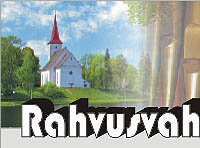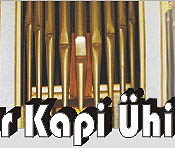The Statutes of the non-profit association
Artur Kapp International Society (here called Society)
have been confirmed on 26 October 2001 by the founding meeting of the Society
with founding contract.
1. Name, location and purpose of the non-profit Society
1.1 The official name of the non-profit Society is Artur Kapp International
Society, in Estonian: Rahvusvaheline Artur Kapi Ühing
1.2 The location of the Society is The Republic of Estonia, city of Suure-Jaani
1.3 The purpose of the Society is to present, propagate and internationally
disseminate the musical works of Artur Kapp. The wide aim of society
is to introduce life and creation of famous people from neighbourhood
of Suure-Jaani.
1.4 In order to achieve this purpose the Society:
1.4.1 will assist research and presentations about
the life and works of Artur Kapp, will make suggestions for
recording the musical works of Artur Kapp, and also
assist in arranging concerts, festivals and competitions;
1.4.2.to propagate life and creation of famous people
from neighbourhood of Suure-Jaani.
1.5. The Society has the right to publish booklets, books and audio
materials, arrange concerts, music festivals, conferences and other
events; create funds, issue scholarships, grants and prizes
1.6 The fiscal year of the Society runs from 1 January to 31 December
1.7 The Society has been founded without a time limit
2. The members of the Society
2.1. Any person, regardless of domicile, who wishes to promote activities
in harmony with the purpose of the Society, can be a member
2.2. The Board of the Society decides membership after a written application.
The applicants will be informed by the Society orally or in writing.
The membership will be valid from the day when the Board makes its decision
2.3 Membership is terminated:
2.3.1 for living persons by death and for legal persons
if their activities cease;
2.3.2 if the member wishes to leave by presenting
a letter 2 months in advance
2.3.3 if the member is expelled by the Assembly on
suggestion by the Board, if the activities of the member
are not in harmony with the principles and statutes
of the Society, also in case the membership fee has not
been paid for the last two years
2.4 A member of the Society has the right:
2.4.1 to take part and vote on Assembly meetings
2.4.2 to elect and be elected to the governing and
controlling organs and committees of the Society;
2.4.3 to demand the Board to call a General Assembly
meeting for all members as prescribed in the Statutes;
2.4.4 to receive information from the Assembly and
the Board about the Society’s activities;
2.4.5 to leave the Society
2.5 The members of the Society are obliged:
2.5.1 to follow the Statutes and the decisions of
the organs of the Society when taking part in its activities;
2.5.2 to inform the Board of their residence and address
within two months of any change of those, so that the
Society may account for its members;
2.5.3 to pay the membership fees as decided by the
General Assembly
2.6 Additional duties may be given members by decision of the General
Assembly
2.7 Any living or legal persons may become Sponsors, who support the
Society with sums within limits decided by the Board
3. The General Assembly
3.1 The highest organ of the Society is the General Assembly. The Board
calls the General Assembly. Decisions are made by a majority of present
members
3.2. The General Assembly will be called at least once a year. The date,
agenda and the projects which will be brought up will be announced to
all members at least two weeks before
3.3 The General Assembly may:
3.3.1 change the statutes;
3.3.2 change the purpose;
3.3.3 elect members of the Board;
3.3.4 decide the membership fee;
3.3.5 elect members of the auditing committee, consisting
of 2-3 members
3.3.6 decide matters, which are not given by law or
statutes to other organs to decide
4. The Board
4.1. The Board is the governing organ of the Society, which represents
and leads the Society;
4.2 The Board consists of five (5) to nine (9) members, who will be
elected at the founding of the Society by the charter signatories for
a term of three (3) years. When the term has passed the next Board will
be elected by the General Assembly
4.3 The Board will elect a chairman and a vice-chairman among its members
4.4 The Board represents the Society in all legal matters
4.5 The decisions of the Board will be taken by a majority of at least
half of its members;
4.6 The Board will be called to a meeting by the chairman when necessary,
but not less than once a quarter of year.
4.7 The Board will decide:
4.7.1 the governing of the Society in accordance with
the Statutes and the decisions of the General Assembly;
4.7.2 the receiving and dismissing of members of the
Society according to the Statutes;
4.7.3 the compilation of a yearly activity and economical
Report and its presentation to the General Assembly
according to law;
4.7.4 the preparation for and calling of a General
Assembly;
4.7.5 the book-keeping of the Society according to
law;
4.7.6 recruiting and dismissing workers of the Society,
deciding their tasks and salaries;
4.7.7 awarding scholarships, grants, prizes etc
4.7.8 all other issues, which are not decided by the
General Assembly
4.7.9 affirmation of associate member
5. Economical activities and property of the Society
5.1. The Society has the right to own material and immaterial rights
and have obligations, it may have property, an independent budget, a
bank account
5.2. The Society has the right to enter contractual relations with individuals
or legal persons in the Republic of Estonia and other countries and
to develop those relations; it may also be member of local and international
organisations
5.3. The Society may take loans from Estonian and foreign banks, from
legal persons in the Republic of Estonia or other countries, it may
also lend money
5.4. The Society will get its material means from membership fees, aid,
gifts, donations and other collections, from activities carried out
according to its stated purpose and aims, from income received by using
means belonging to the Society, from other contributions according to
the laws of the Republic of Estonia
5.5. The Society may possess any property, which is necessary to carry
out the purpose of its statutes and which is not prohibited by law
5.6. The State has no obligation to economically grant the activities
of the Society and the Society has none regarding the duties of the
State. The Society grants its activities with the means belonging to
the Society
6. Ending the Society
6.1 The amalgamation, division or liquidation of the Society will be
done according to the law
6.2 The Society will be liquidated by members of the Board or persons
appointed by the General Assembly
6.3 In case the Society is liquidated any remaining property will be
handed over to a non-profit organisation with similar aims
|







